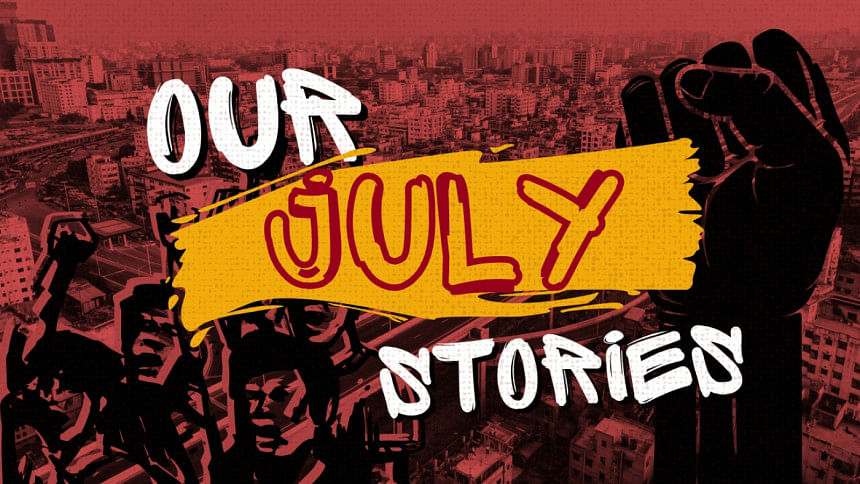To fold a city into silence

The bus stop was empty as usual, I sat waiting for a sight of one. Then he came. A man in a faded red shirt with a bag hanging on his back, running as if the devil himself had taken out a lease on his shadow. He collapsed onto the bench beside me, his sweat sharp, anxious with the fear of a hundred things. Before I could speak, the gunshot cracked the air, a sound so loud it wasn't sound at all, rather a rupture, a tear in the fabric of the ordinary day I planned to have but my body knew before my mind: this was not a day for buses.
Where—? I started, staring at his face. Wide, liquid, the eyes of a man who had just seen history rewrite itself in blood.
"My friend is dead," he said, and in his voice was the quiet fury of the unexceptional, the way people here learned to say such things without flinching.
Down the road, a pack of boys moved like a single organism, they had wooden sticks raised above their heads like they tied an invisible flag to it. That would protect them, stand with them in need. They were young, too young, but their faces were old with the knowledge of what sticks could do when rains of bullets chased them. Around us, the street folded in on itself, the shopkeepers yanked down corrugated shutters, mothers dragged children inside by their wrists, a stray dog trotted past, ribs heaving.
I should have run. But the body is a stubborn thing; mine stayed rooted, as if my bones had turned to stone. Only when the second shot rang out closer now, a punctuation mark to some unspeakable sentence, did my hands move of their own accord. I held my bag to my chest for the newest fear of bullets.
I did not know where to go. The street had become a living thing, recoiling. The shutters slammed down over market stalls, their metallic shrieks cutting through the heat. Cars and motorcycles stood abandoned, their engines burning gasoline into air, their riders vanished into the cracks of the city. The July sun hung low and white like a merciless witness. But no crueller than this day, or the silence that followed each gunshot, it was its own kind of violence.
The rickshaw driver's eyes met mine. He did not ask where I needed to go. There was only one direction now: away.
His legs pedalled through the unknown corners of the city I had lived in all my life, which I called my city. In that moment, I no longer recognised it. We slipped through alleyways so narrow the rickshaw's wheels grazed the walls, scraping off flakes of old propaganda posters. Vote for Progress, one fragment read, clinging to the brick. The buildings here leaned into one another with balconies so close a neighbour could pass a cup of sugar or a curse across the gap without stretching. Those windows were sealed shut, yet I felt eyes tracking us with the weight of held breaths.
I gripped my bag tighter. Inside it was a wallet, a half-finished novel, my student ID, and a tube of lipstick. Ordinary things. Useless things. The rickshaw lurched around a corner, and for a dizzying second, I saw my own face reflected in a darkened shop window, wide-eyed, mouth slightly open, a portrait of a woman who had just learned how quickly a day could unravel.
The terror did not fade. It only changed shape. From the sharp scream of bullets to this: the slow, sickening realisation that the streets I'd walked blindfolded as a child were now a maze with no exit. The driver hunched over the handles, his shoulders sharp as blades. He knew these turns, these shadows. I wondered if he, too, was counting the gunshots in his head, measuring the distance between each one like the spaces between heartbeats.
He left me in a distant alley, saying, "May God's mercy be upon you."
I blinked and he was gone. There were slow murmurs and loud screams ahead translating to rebellious chants. I looked around and an elderly woman called me into her house. I went inside to find at least 20 young girls and boys hiding there.
The woman bolted the door behind me. Outside, hour by hour the chants swelled, like a tide against the shore. Gunshots were faster than the blinking of eyes. Inside, we were silent. Waiting. The walls felt as thin as parchment that trembled with every shout. I thought of the rickshaw driver's prayer. Mercy, from this day forward, was going to be a currency out of circulation.
Ohona Anjum writes, rhymes, and studies English Literature.

 For all latest news, follow The Daily Star's Google News channel.
For all latest news, follow The Daily Star's Google News channel. 



Comments